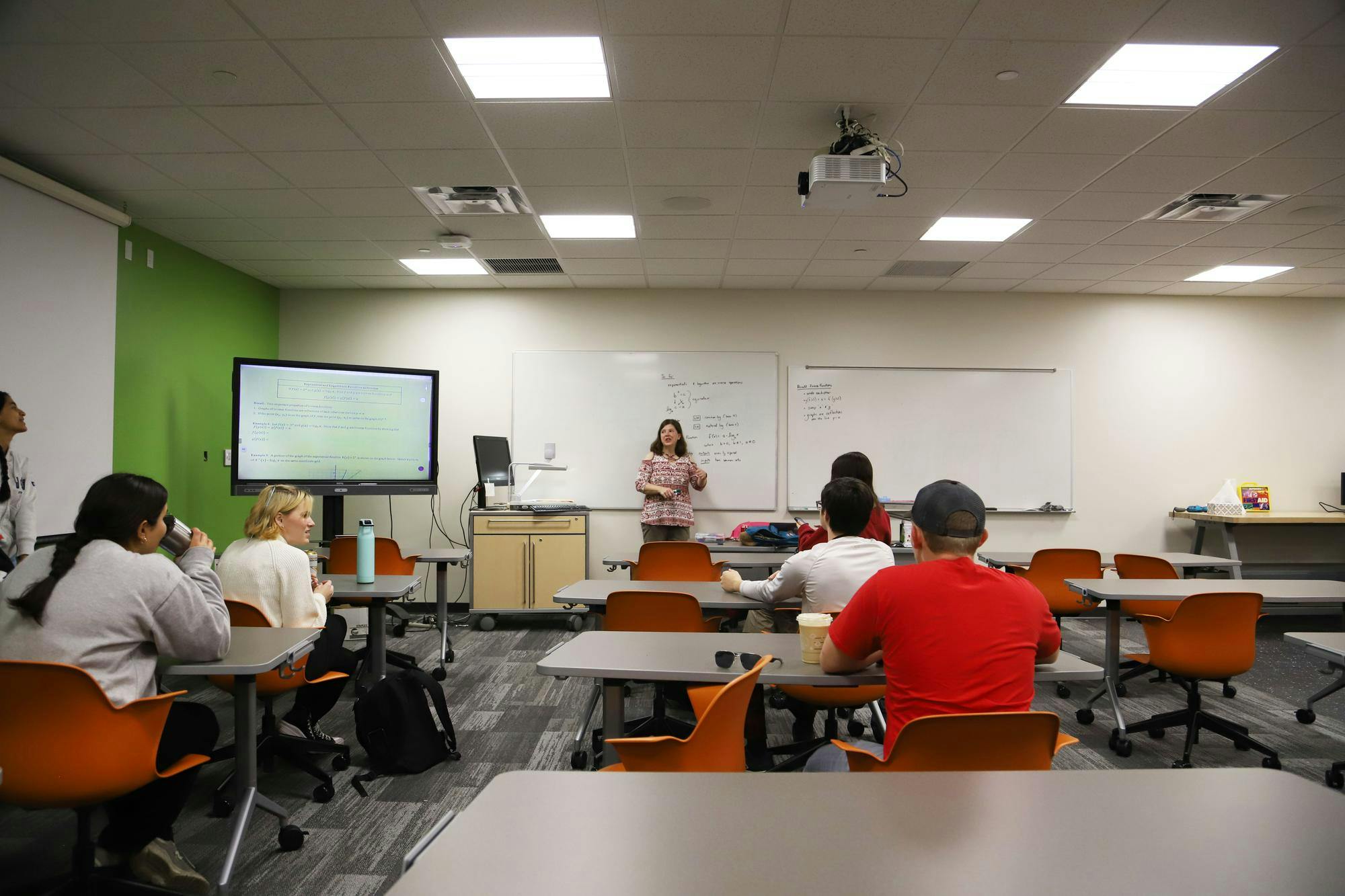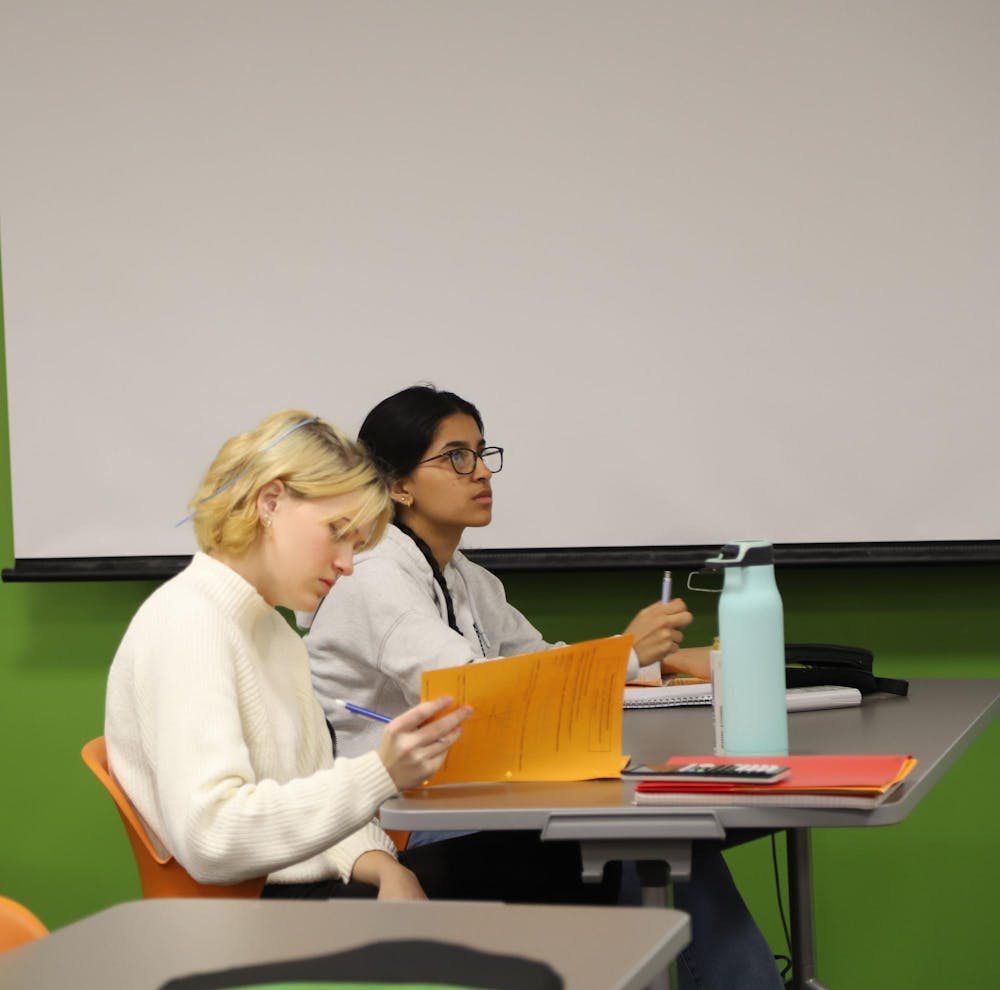Imagine you could complete 30 hours of college credit before ever even graduating high school.
To some, it might seem like an unimaginable concept on top of the workload they already have to satisfy their current academic requirements. To others, it’s a chance to possibly graduate from college early and either get a headstart on their careers or embark on a higher education.
With the addition of the Indiana College Core (ICC) to its dual credit program, Ball State University has made this opportunity a reality for several high school students.
The dual credit program has been around since about 1997, allowing high school students to take college classes through Ball State in person with their teachers or online with actual professors while also completing their academic requirements for high school.
The ICC curriculum was added to the program this past fall, allowing students to earn up to 30 credits for their eventual college diploma. According to the ICC website, the program gives high school students the ability to get ahead with their schooling, with specific emphasis on the fact that it helps you “focus on major-specific coursework, [have] more flexibility in your schedule, increase your academic confidence [and] reduce your stress level.”
James Hendrix, the Assistant Director for High School and State-wide initiatives at Ball State, said that while the ICC has many benefits for students in the dual credit program, one of the main ones is to increase college graduation rates.
Indiana's college-going rate has steadily declined since about 2015. The most recent data from the Indiana Commission for Higher Education shows that only about 59% of Indiana high school students graduate who pursue some type of higher education
“The state of Indiana has been pushing for a long time for more folks to get some type of degree…and really encourage them to seek higher education. So that’s exactly what we try to do in the dual credit program,” Hendrix said.
According to Hendrix, the ICC also helps students transition from high school to college. This is because the new opportunity to receive up to 30 college credits while still in high school gives them a good idea of the expectations they’ll face in their classes when enrolled in a university.
Although the ICC was officially introduced into the program this fall, students gaining multiple hours of college credit in high school is a concept introduced previously in many high schools nationwide. According to data from The Department of Education, “By 2015, nearly 70 percent of high schools offered dual enrollment.”
The growing popularity of high schools offering dual credit courses through colleges and universities is due to various benefits, the most significant being the amount of money students and their families will save on a college education. This is especially true for the ICC, as the cost of taking the necessary college courses for the core in high school is significantly less than paying for them as a part of college tuition after high school graduation.
“We started with $25 per credit hour for Career and Technical Education (CTE) and liberal arts courses, which students will need in high school and college,” Hendrix said. “Then there’s another level of $250 per course…if the course is not on the CTE list. Then there’s the third level…Ball State University professors teach the course online. They are $350 per course. So lots and lots of savings.”
The ICC was recently approved by the State of Indiana to offer the core in April 2023. According to Hendrix, they have one school that has committed and has signed a memorandum of understanding (MOU): The Indiana Academy Right on Ball State’s campus.
“Over 86% of our students are registered for dual credit this fall alone,” said Meg Wright, Assistant Director of Academic Advising and Guidance at Indiana Academy, via email.
Wright said the ICC benefits students because they already have college-level experience in more than just math, sciences or languages.
“The addition of the ICC should further improve dual credit students’ readiness for college and make the transition easier: they can hopefully now take more of the major-focused courses they are interested in,” Wright said.

She also emphasized the fact that the program itself gives students a head start on finishing their degree, as it gives them more time to take a variety of courses to discover their true interests.
“Our students already start ahead of the game in college, but this ICC allows them to be guaranteed all those credits…transfer that they have in math, science, arts and humanities, social science and English,” Wright said. “This will be positive for those students who take advantage of it.”
Previously, state universities and colleges could pick and choose what they gave credit for based on the core transfer library, according to Wright.
One student who has already seen success with the Indiana College Core through the dual credit program is junior Ella Robinson from The Indiana Academy. She decided to attend The Indiana Academy and enroll in dual credit classes after she wasn’t feeling challenged enough at her old school.
“My old school had many AP classes but only a few dual credit classes, so this was a new experience,” Robinson said via email. “Getting a jump on and being more prepared for my college classes and maybe even getting a year of college done motivated me to participate in this program.”
Currently, Robinson is enrolled in AP Physics 1 this semester through the Indiana College Core as a part of Ball State’s dual credit program. She also plans on enrolling in AP Statistics and a Ball State University public speaking class next semester.
When asked about her future, Robinson said that she plans on going into the business world, specifically marketing or economics. When she attends her first year of college, she wants to double major in marketing and international business, get a minor in economics, and graduate school to obtain her master’s degree.
“Having the college credit that this dual credit program will give me makes those goals more achievable; I will have many of my general credits already completed…I can focus on the areas of study that will best help me prepare for my future, or maybe even allow me to graduate college a year early,” Robinson said.
According to the Academy’s Executive Director, Dr. Dain Kavars, The Indiana Academy offers approximately 40 dual credit courses to students through Ball State, which adds up to over 140 college credit hours.
Earning the Indiana College Core ensures that all 30 college credits will transfer to an Indiana public college, university, or any private Indiana College willing to participate. This encourages students to earn more college credit during high school and enroll in Indiana Colleges and universities after high school.
“Earning more college credit hours while in high school provides significant opportunities for Academy students,” Kavars said. “Students can use their college credit to earn a bachelor’s degree in less time…pursue a double or triple major, join research labs with professors, and work on a master's or doctorate earlier than they would.”
The addition of the Indiana College Core to Ball State’s dual credit program has significantly changed the impact of the program, as it’s granted students a multitude of opportunities for career and academic success that haven’t been presented to them before.
The hope is to motivate students to obtain a degree, interest them in the idea of a higher education, and influence them to take advantage of the dual credit courses that will most benefit them when transitioning over to college in the future.
If a student is interested in enrolling in the dual credit program, they can do so via email at dualcredit@bsu.edu.
Contact Meghan Braddy with comments via email at meghan.braddy@bsu.edu or on X @meghan_braddy.





